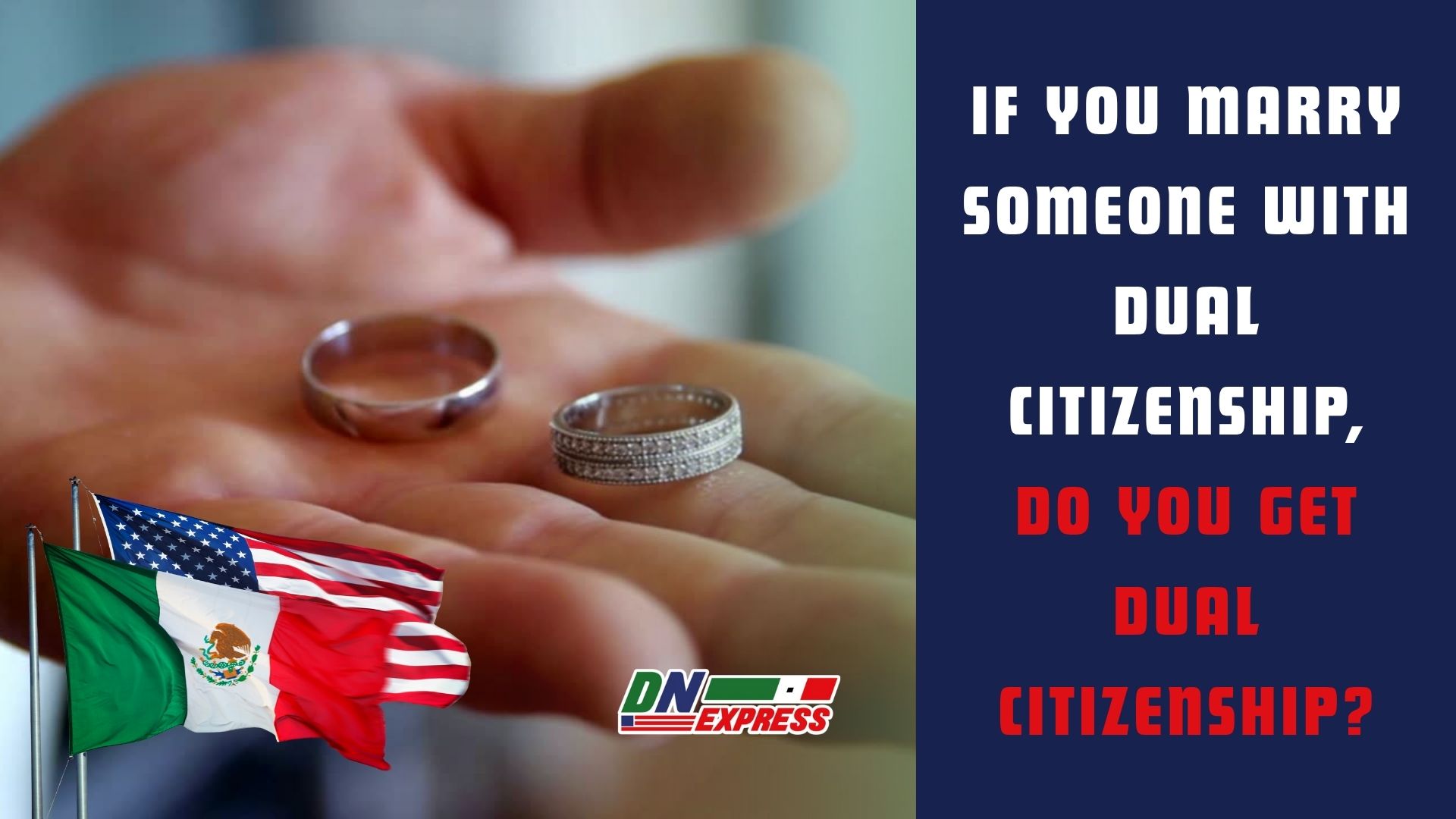
Marrying a dual citizen doesn’t automatically give you dual citizenship. Each country’s laws differ, some offer a pathway to citizenship, others require residency, and many don’t allow it at all.
Here’s what you need to know before starting the process.
Marriage can create opportunities for permanent residency or eventual naturalization, but timelines and requirements vary by country.
In Mexico, for example, a foreign spouse can apply for citizenship after 2 years of cohabitation in Mexico. In the U.S., it takes at least 3 years with a green card.
We’ve helped countless families navigate these complex laws, often without ever setting foot in a consulate. Whether you’re correcting vital records, reclaiming Mexican nationality, or helping a spouse or child gain citizenship, we know how to simplify the process.
Want the full breakdown of how marriage affects dual citizenship and how you can take action?
Keep reading, we’ll cover every scenario step by step.
Does Marriage to a Dual Citizen Automatically Make You a Dual Citizen?
No really.
Marriage to a dual citizen doesn’t grant you instant access to either of their nationalities.
Instead, most countries treat marriage as a pathway to citizenship, not a guarantee.
This means you’ll need to apply, fulfill residency and language requirements, and often wait several years before you qualify.
Take the United States as an example. A foreign spouse first applies for a green card. After holding permanent residency and living in the U.S. with their citizen spouse for at least 3 years, they can apply for naturalization.
But this process isn’t automatic, you must meet strict eligibility criteria and pass interviews.
In Mexico, we know marriage creates a faster route, but it still requires processing time.
A foreign spouse can apply for Mexican citizenship after 2 years of marriage and cohabitation in Mexico. Even then, they must prove the marriage is genuine, pass a Spanish-language interview, and submit extensive documentation.
The bottom line: marrying a dual citizen might open doors to residency or citizenship, but you won’t simply inherit both nationalities.
Each country has its own rules, and some don’t allow dual citizenship at all.
We specialize in helping U.S. residents navigate Mexico’s marriage-based nationality process, often without needing to visit the consulate.
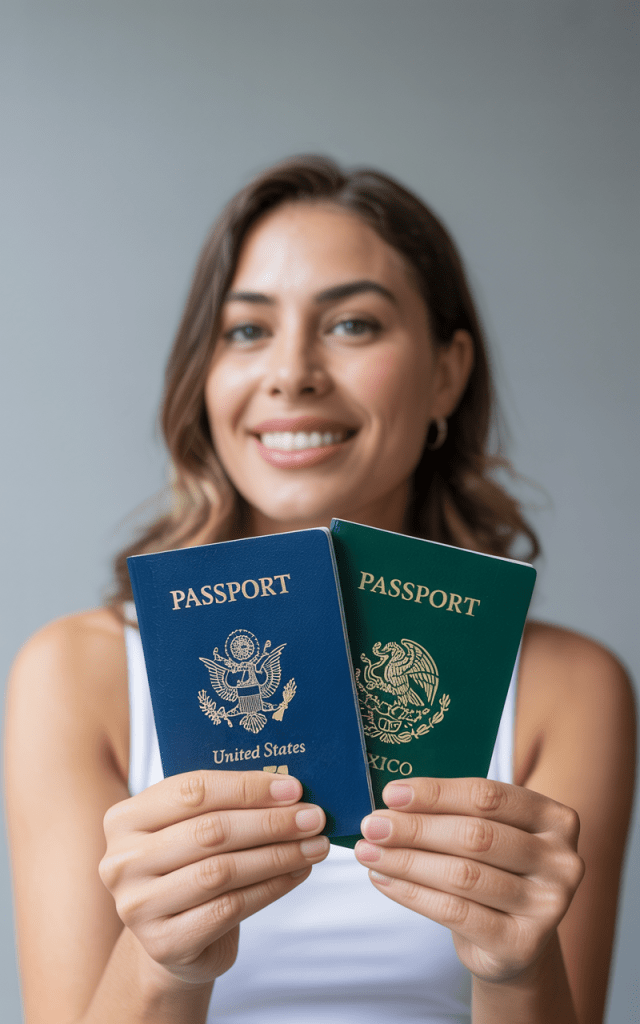
How This May Differ for You (By Situation)
While marriage to a dual citizen may seem like a shortcut, the reality depends heavily on your personal situation.
Here’s how the rules play out for five frequent groups we often encounter:
U.S.-Born Children of Mexican Parents
If you were born in the U.S. and have at least one Mexican parent, you’re already entitled to Mexican citizenship by descent. This means you can reclaim your nationality without relying on marriage.
However, marrying a Mexican dual citizen won’t automatically give you rights to their citizenships.
You still need to apply formally and meet the same requirements as any other spouse.
Adults Correcting Documents to Reclaim Nationality
If errors in your birth certificate or other vital records have blocked you from reclaiming Mexican nationality, fixing those mistakes is your first priority.
Marriage to a dual citizen won’t bypass this step. Only after your legal identity matches across documents can you pursue citizenship.
Our team specializes in correcting mismatched names, missing parents, and dual registrations that hold people back.
Parents Securing Mexican Citizenship for U.S.-Born Kids
For parents of U.S.-born children, the simplest path is often to register your child’s birth with Mexican authorities.
Marrying a Mexican dual citizen doesn’t automatically make your children dual nationals.
Instead, you’ll need to take deliberate steps to pass your nationality down.
Individuals Previously Denied by the Consulate
If a consulate has previously rejected your application for nationality or passport services, marrying a dual citizen won’t erase those issues.
But there’s hope, with a legal team like our team, you may be able to resolve those obstacles without ever setting foot in a consulate again.
Mexican Citizens Helping Foreign Spouses or Children
If you’re a Mexican citizen married to a foreign spouse, your partner may qualify for Mexican residency first.
After 2 years of marriage and cohabitation in Mexico, they can apply for citizenship.
Children born from these unions may qualify automatically for Mexican nationality if their birth is properly registered.
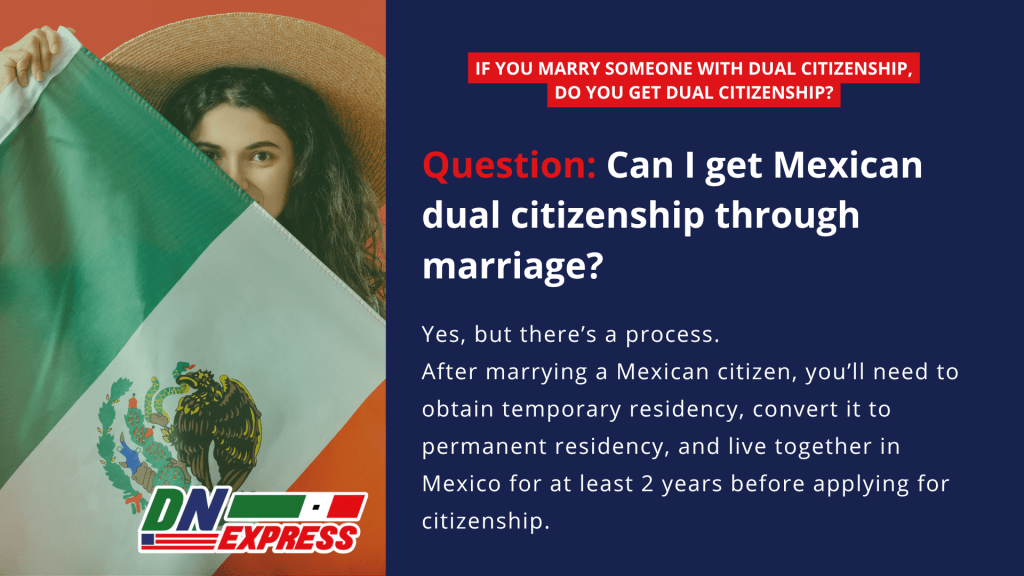
Why DIY May Cost You More: The Risks of Doing It Alone
Trying to handle marriage-based citizenship on your own may seem like a way to save money, but for many families, it ends up costing far more in time, stress, and even lost opportunities.
-
Mexican Bureaucracy Is Complex
One small mistake, like a name mismatch on a birth certificate, can add months or even years to your timeline.
We often see clients come to us after multiple failed attempts with the consulate.
-
Missing or Incorrect Documents Lead to Rejection
Consulate staff are quick to reject applications with incomplete or inconsistent paperwork. Without an attorney to spot errors in advance, even minor issues like a missing parent’s name can derail your case entirely.
-
Language Barriers and Residency Rules Surprise Many Couples
Mexico requires applicants to pass a Spanish-language interview, even if they’re married to a citizen. Many spouses also don’t realize they must physically live in Mexico for 2 years to qualify, only finding out after years of waiting abroad.
-
The Hidden Costs of Starting Over
Every rejection means starting over with fees, translations, and time lost. Worse, some families miss critical deadlines for reclaiming nationality because they weren’t aware of eligibility limits.
We’ve seen it all, and fixed it all.
Our team catches errors before they cause delays and guides you step-by-step so you don’t waste years fighting the system alone.
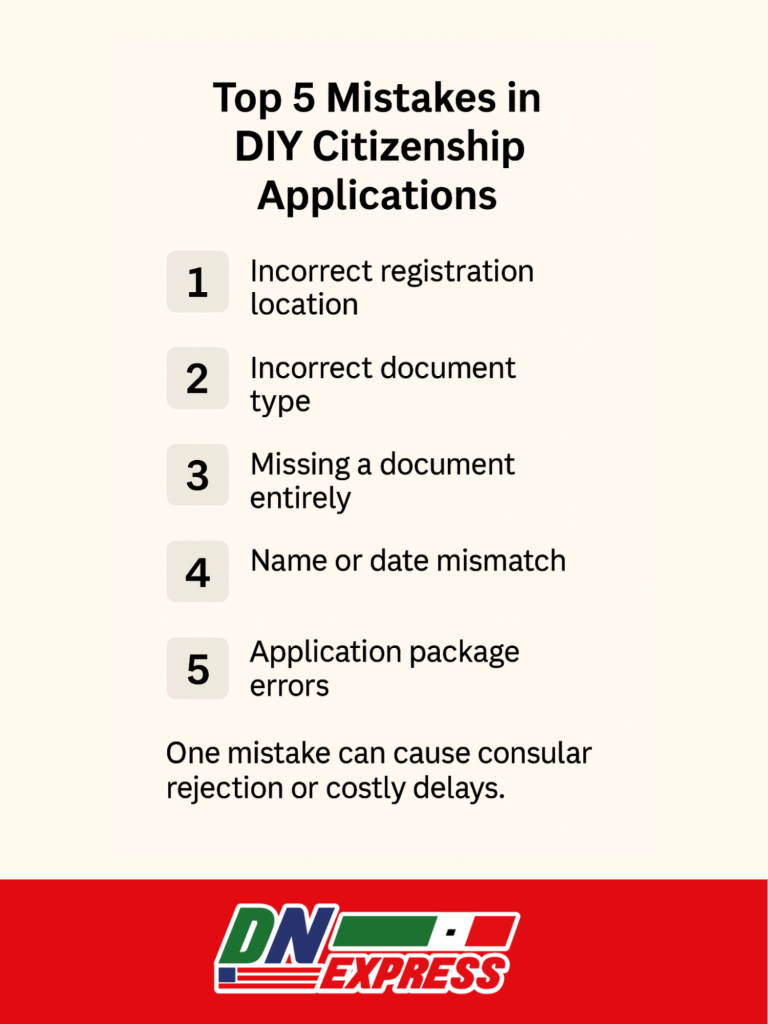
Why Work With Doble Nacionalidad Express?
When it comes to securing Mexican dual citizenship, the difference between success and endless delays often comes down to who’s guiding you. We make the complex simple, so you can focus on your family, not Mexican bureaucracy.
What Sets DNExpress Apart
-
🇲🇽 Dual Citizenship Without the Consulate
Skip the months-long consulate appointments and endless paperwork. We handle the process directly in Mexico on your behalf.
-
🏛 Handled by Licensed Mexican Attorneys
We’re not just a document prep service. Your case is managed start-to-finish by bilingual attorneys licensed in Mexico, giving you confidence every step of the way.
-
🕑 Fast Turnaround with Nationwide Coverage
Whether you’re in Texas, California, or anywhere else in the U.S., our team works with Mexican civil registries across the country to deliver results quickly.
-
📜 Experts in Fixing Tough Cases
Name mismatches, missing parents on birth certificates, or prior rejections? We’ve seen it all, and resolved it all.
Success Stories
“I thought my case was hopeless, but DNExpress handled it while I stayed in the U.S. I got my Mexican passport in hand without ever setting foot in the consulate.” – Carol F., Los Angeles
“They found and corrected a 20-year-old error in my birth certificate that was blocking my kids from getting their Mexican nationality.” – Jorge R., Chicago
Take Action Today
You don’t have to face confusing paperwork, long waits, or consulate rejections alone.
With our help, you can reclaim your Mexican nationality or secure dual citizenship for your family, all without leaving the U.S.
- Schedule a free case review to find out if you qualify.
- Start your process from home, we handle everything directly in Mexico.
- Call or WhatsApp us today to get a personalized plan from our bilingual legal team.
Your Mexican passport or dual citizenship isn’t out of reach. Let us help you make it a reality.

Your Most Frequent Questions About Marriage and Dual Citizenship (Answered)
Marriage to a dual citizen raises a lot of questions, especially when laws differ from country to country.
Here are the answers to the ones we hear most often:
Can I get dual citizenship if I marry someone with dual citizenship?
No. Marriage doesn’t automatically grant you either of your spouse’s nationalities.
However, it may allow you to apply for residency in one of their countries and eventually pursue citizenship through naturalization.
Does marriage automatically give citizenship?
No.
Most countries require you to live with your spouse for several years before applying.
For example, in Mexico you must cohabitate for 2 years before you can apply for citizenship.
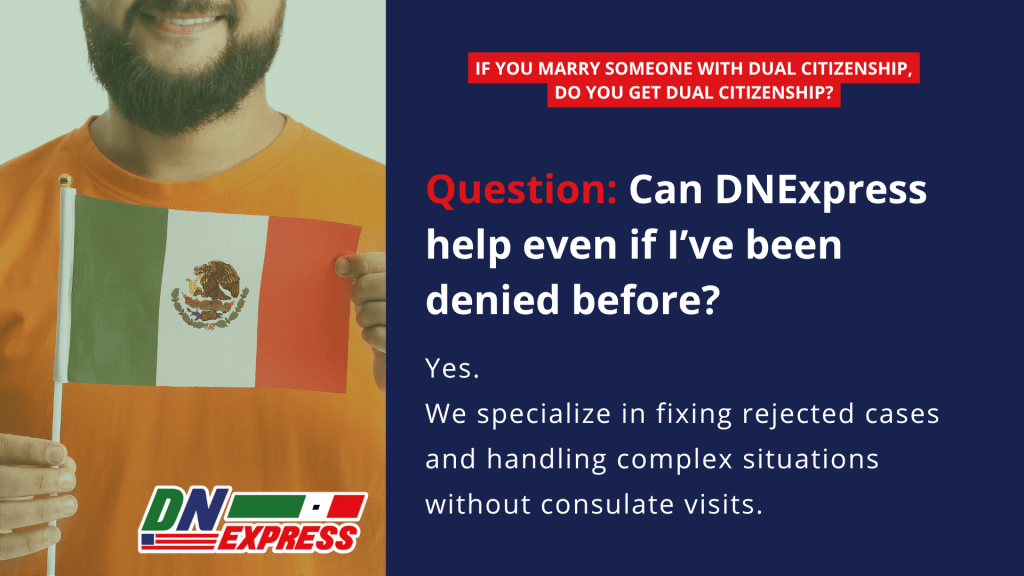
What qualifies someone for dual citizenship?
Dual citizenship is typically acquired through birthright (being born in a country), descent (having a citizen parent), naturalization (applying after years of residence), or investment.
Marriage is only a potential gateway, not a qualification on its own.
Can I get Mexican dual citizenship through marriage?
Yes, but there’s a process.
After marrying a Mexican citizen, you’ll need to obtain temporary residency, convert it to permanent residency, and live together in Mexico for at least 2 years before applying for citizenship.
How long must I be married to get citizenship?
It depends on the country:
- México – 2 years of marriage and cohabitation
- United States – 3 years as a green card holder
- España – 1 year of marriage and residence
What disqualifies someone from dual citizenship?
Factors like criminal records, sham marriages, failure to meet residency requirements, or prior immigration violations can block your path to citizenship.
Do dual citizens pay taxes in both countries?
Possibly. U.S. citizens are taxed on worldwide income regardless of where they live. In Mexico, you may owe taxes if you’re considered a resident for tax purposes.
Proper planning is fundamental to avoid surprises.
Do I lose my citizenship if I marry a foreigner?
No.
Neither the U.S. nor Mexico revokes your citizenship simply because you marry a foreign national. Both countries recognize and allow dual citizenship.
Can a U.S. citizen legally hold dual citizenship?
Yes.
The U.S. does not require you to renounce your American citizenship, and Mexico allows dual nationality as well.
Can I marry into dual citizenship?
Marriage alone won’t grant you citizenship, you’ll still need to apply and meet requirements.
Will I lose my U.S. citizenship?
No.
The U.S. allows dual citizenship and doesn’t revoke your status for marrying a foreign national.
Can DNExpress help even if I’ve been denied before?
Yes.
We specialize in fixing rejected cases and handling complex situations without consulate visits.
Contact us, Schedule a Free Case Review o Message Us on WhatsApp.



